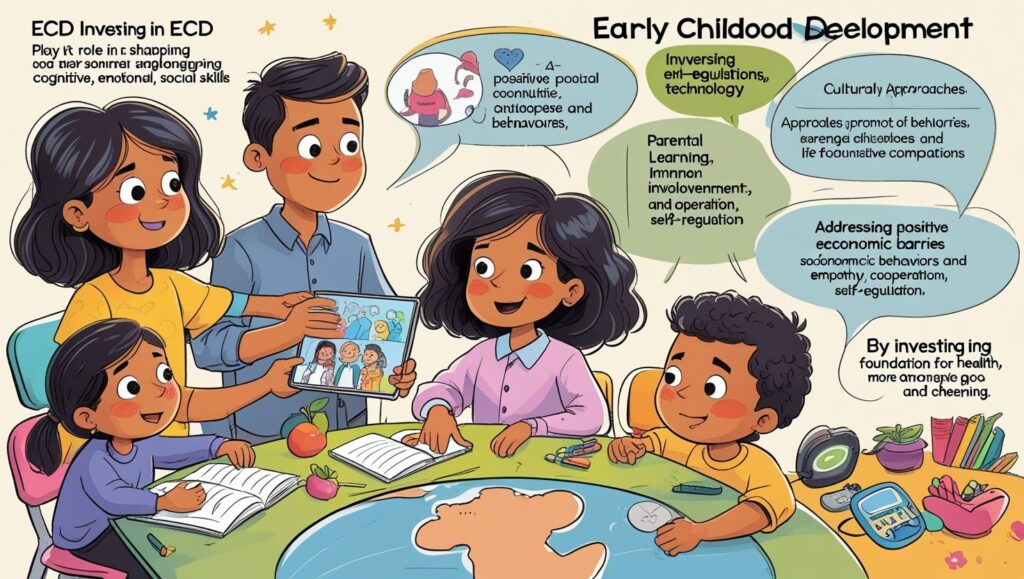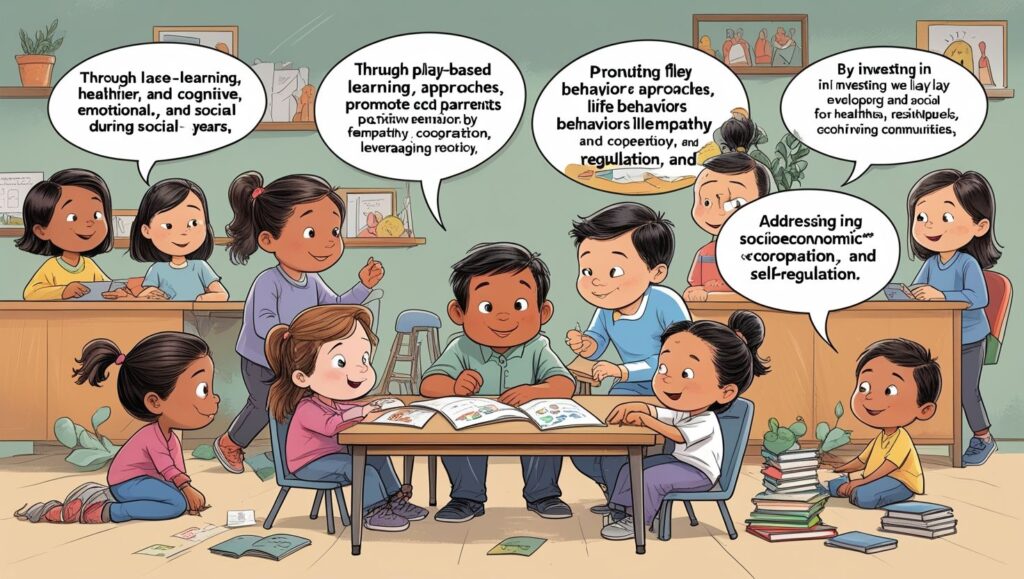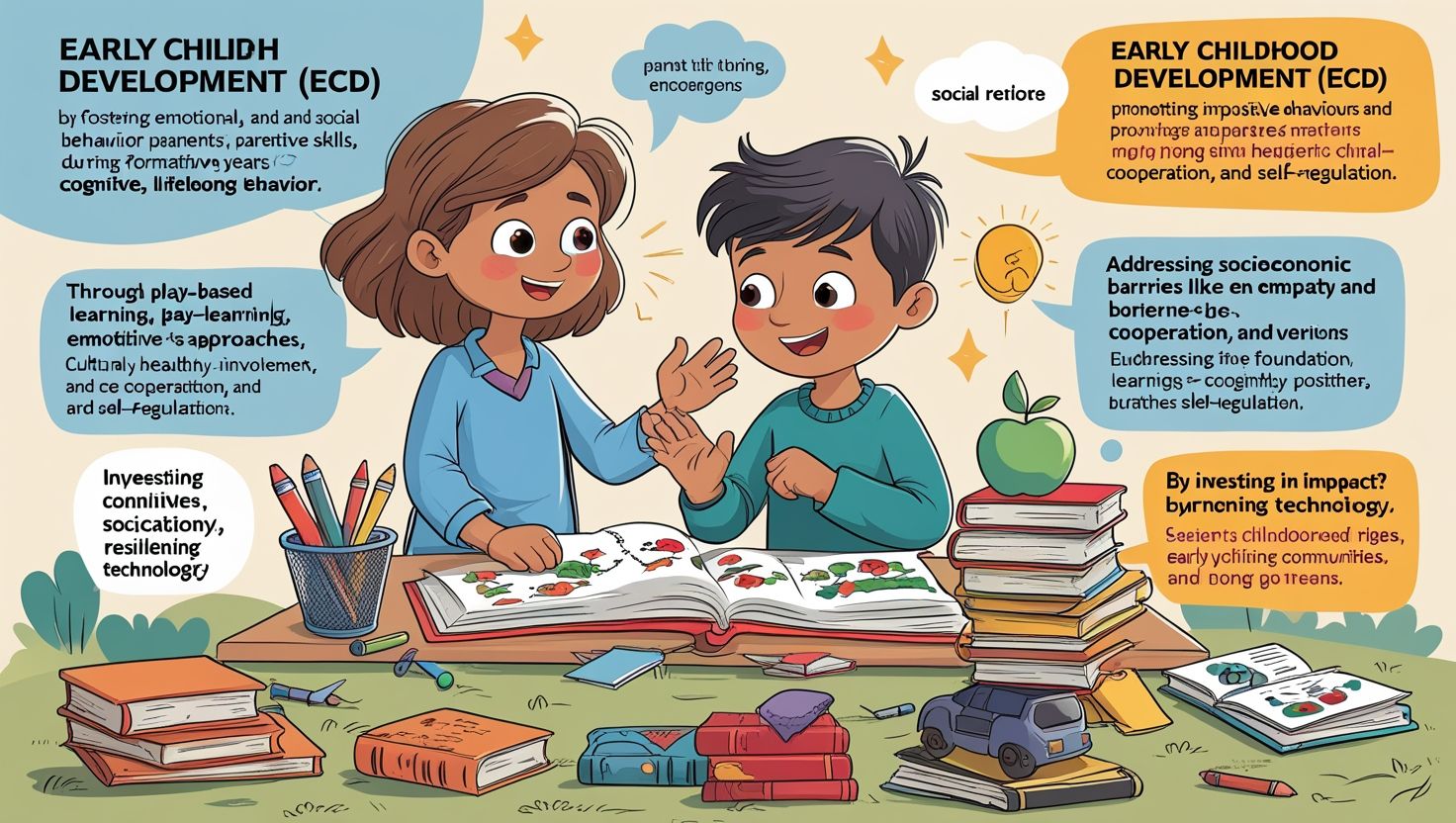The Role of (ECD) in Behavior Change, Early Childhood Development (ECD) is a critical phase in human life that lays the foundation for lifelong learning, health, and behavior. The experiences and environments children are exposed to during their early years significantly shape their cognitive, emotional, and social development. ECD programs play a pivotal role in influencing behavior change, not only in children but also in their families and communities. This article explores the importance of ECD in fostering positive behavior change and its long-term impact on individuals and society.
The Importance of Early Childhood Development
The first few years of a child’s life are marked by rapid brain development, with neural connections forming at an astonishing rate. During this period, children are highly receptive to learning and adapting to their surroundings. ECD programs focus on providing nurturing environments that stimulate cognitive, emotional, and social growth. These programs emphasize play-based learning, positive interactions, and the development of essential life skills, which are crucial for behavior change.
Behavior change in early childhood is not limited to the child alone; it extends to parents, caregivers, and the broader community. ECD programs often include components that educate parents on effective parenting practices, such as positive discipline, communication, and emotional support. By equipping caregivers with the knowledge and skills to foster healthy development, ECD initiatives create a ripple effect that promotes positive behavior change across generations.
Building Emotional and Social Skills
One of the primary goals of ECD is to help children develop emotional and social skills that are essential for healthy relationships and behavior. Emotional regulation, empathy, and cooperation are some of the key skills nurtured through ECD programs. Children learn to identify and manage their emotions, understand the feelings of others, and resolve conflicts peacefully. These skills form the basis for positive behavior and help children navigate social interactions throughout their lives.
ECD programs also address behavioral challenges by teaching children appropriate ways to express themselves and interact with others. For instance, children who struggle with aggression or impulsivity are guided toward more constructive behaviors through role-playing, storytelling, and group activities. By addressing behavioral issues early, ECD programs prevent the escalation of problems and promote long-term well-being.

The Role of Play in Behavior Change
Play is a fundamental aspect of ECD and a powerful tool for behavior change. Through play, children explore their environment, experiment with different roles, and learn to solve problems. Play-based learning encourages creativity, curiosity, and resilience, all of which contribute to positive behavior. For example, cooperative games teach children the value of teamwork and sharing, while imaginative play helps them develop empathy and perspective-taking.
ECD programs incorporate structured and unstructured play activities to support holistic development. Structured play, such as guided games and activities, helps children learn specific skills and behaviors, while unstructured play allows them to explore and express themselves freely. By balancing these approaches, ECD programs create an environment where children can develop self-confidence, independence, and a sense of responsibility.
Parental Involvement and Behavior Change
Parents and caregivers play a crucial role in shaping children’s behavior, and ECD programs actively involve them in the learning process. Parenting education sessions, workshops, and home visits are common components of ECD initiatives. These activities provide parents with the tools and strategies to support their child’s development and address behavioral challenges effectively.
For example, parents learn how to use positive reinforcement to encourage desired behaviors and set clear boundaries to discourage negative ones. They also gain insights into the importance of consistency, patience, and empathy in parenting. By empowering parents to adopt positive parenting practices, ECD programs create a supportive home environment that reinforces the behavior change initiated in early childhood settings.
Addressing Socioeconomic and Cultural Factors
Behavior change through ECD is influenced by socioeconomic and cultural factors that shape children’s experiences. Children from disadvantaged backgrounds often face barriers to healthy development, such as poverty, malnutrition, and limited access to education. ECD programs aim to address these challenges by providing comprehensive support, including nutrition, healthcare, and early learning opportunities.
Cultural norms and practices also play a significant role in shaping behavior. ECD programs must be culturally sensitive and adaptable to ensure they resonate with the communities they serve. By incorporating local traditions, languages, and values, ECD initiatives can promote behavior change in a way that is meaningful and sustainable. This approach fosters trust and collaboration between families and ECD providers, enhancing the effectiveness of interventions.
Long-Term Impact of ECD on Behavior
The benefits of ECD extend far beyond early childhood, influencing behavior and outcomes throughout life. Research shows that children who participate in high-quality ECD programs are more likely to exhibit positive behaviors, such as self-discipline, perseverance, and empathy. These behaviors contribute to academic success, healthy relationships, and responsible citizenship in adulthood.
ECD also has a preventive effect on negative behaviors, such as aggression, delinquency, and substance abuse. By addressing risk factors and promoting protective factors early in life, ECD programs reduce the likelihood of behavioral problems later on. This not only benefits individuals but also has a positive impact on society by reducing crime rates, improving public health, and fostering social cohesion.

Challenges in Implementing ECD Programs
Despite the proven benefits of ECD, there are significant challenges in implementing effective programs. Limited funding, inadequate infrastructure, and a lack of trained professionals are common barriers, particularly in low-resource settings. Additionally, reaching marginalized and remote communities can be difficult, leaving many children without access to quality ECD services.
To overcome these challenges, governments, NGOs, and communities must work together to prioritize ECD and allocate sufficient resources. Investing in teacher training, developing culturally relevant curricula, and leveraging technology can enhance the reach and impact of ECD programs. Public awareness campaigns can also highlight the importance of ECD and encourage greater participation from families and communities.
The Role of Technology in ECD
Technology has the potential to revolutionize ECD by expanding access to quality learning resources and supporting behavior change. Digital tools, such as educational apps, online platforms, and virtual classrooms, can provide interactive and engaging learning experiences for children. These tools can also offer personalized learning pathways, catering to the unique needs and abilities of each child.
For parents and caregivers, technology can provide access to parenting resources, training modules, and support networks. Mobile apps and online communities can offer guidance on child development and behavior management, making it easier for parents to implement positive practices at home. However, it is essential to ensure that technology is used responsibly and does not replace the critical role of human interaction in ECD.
Conclusion
Early Childhood Development is a powerful catalyst for behavior change, shaping the cognitive, emotional, and social foundations of individuals. Through play-based learning, parental involvement, and culturally sensitive approaches, ECD programs foster positive behaviors that last a lifetime. By addressing socioeconomic and cultural barriers, investing in quality programs, and leveraging technology, we can ensure that every child has the opportunity to thrive. The long-term impact of ECD extends beyond individuals, contributing to healthier, more cohesive, and prosperous societies. As we recognize the transformative potential of ECD, it is imperative to prioritize and support initiatives that nurture the youngest members of our global community.

10 thoughts on “The Role of (ECD) in Behavior Change”
Comments are closed.